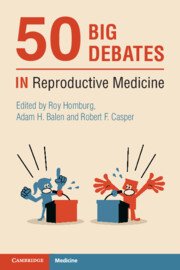Book contents
- 50 Big Debates in Reproductive Medicine
- Series page
- 50 Big Debates in Reproductive Medicine
- Copyright page
- Contents
- Contributors
- Foreword
- Introduction
- Section I Limits for IVF
- Section II IVF Add-ons
- Section III The Best Policy
- Section IV Embryology
- Section V Ethics and Statistics
- Section VI Male-factor Infertility
- Section VII Genetics
- 38A Genome Editing Should Be Allowed for the Prevention of Life-Threatening Genetic Diseases
- 38B Genome Editing Should Be Allowed for the Prevention of Life-Threatening Genetic Diseases
- 39A PGT-A Should Be Offered for Recurrent Implantation Failure
- 39B PGT-A Should Be Offered for Recurrent Implantation Failure
- 40A PGT-A Should Be Offered for All Women
- 40B PGT-A Should Be Offered for All Women
- Section VIII Ovarian Stimulation
- Section IX Hormones and the Environment
- Index
- References
38B - Genome Editing Should Be Allowed for the Prevention of Life-Threatening Genetic Diseases
Against
from Section VII - Genetics
Published online by Cambridge University Press: 25 November 2021
- 50 Big Debates in Reproductive Medicine
- Series page
- 50 Big Debates in Reproductive Medicine
- Copyright page
- Contents
- Contributors
- Foreword
- Introduction
- Section I Limits for IVF
- Section II IVF Add-ons
- Section III The Best Policy
- Section IV Embryology
- Section V Ethics and Statistics
- Section VI Male-factor Infertility
- Section VII Genetics
- 38A Genome Editing Should Be Allowed for the Prevention of Life-Threatening Genetic Diseases
- 38B Genome Editing Should Be Allowed for the Prevention of Life-Threatening Genetic Diseases
- 39A PGT-A Should Be Offered for Recurrent Implantation Failure
- 39B PGT-A Should Be Offered for Recurrent Implantation Failure
- 40A PGT-A Should Be Offered for All Women
- 40B PGT-A Should Be Offered for All Women
- Section VIII Ovarian Stimulation
- Section IX Hormones and the Environment
- Index
- References
Summary
Arguments against the use of germline genome editing (GGE) frequently centre on deontological debates about ‘designer babies’ or human nature. While important, there is a more fundamental reason to be opposed to GGE, namely violations to the principle of health equality and distributive justice. Here, we will argue from a more consequentialist framework: 1. GGE does not meet the ethical requirements of clinical research and translation; 2. GGE will exacerbate existing disparities in access to research and health care; 3. GGE will exacerbate the stigmatisation and marginalisation of those living with health conditions; 4. GGE divert significant resources away from effective solutions to broader public health concerns;
- Type
- Chapter
- Information
- 50 Big Debates in Reproductive Medicine , pp. 197 - 199Publisher: Cambridge University PressPrint publication year: 2021

